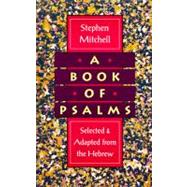
What is included with this book?
The New copy of this book will include any supplemental materials advertised. Please check the title of the book to determine if it should include any access cards, study guides, lab manuals, CDs, etc.
The Used, Rental and eBook copies of this book are not guaranteed to include any supplemental materials. Typically, only the book itself is included. This is true even if the title states it includes any access cards, study guides, lab manuals, CDs, etc.
The Hebrew word for psalm is mizmór, which means a hymn sung to the accompaniment of a lyre. But when the ancient rabbis named the anthology that we know as the Book of Psalms, they called it séfer tehillím, the Book of Praises. That is the dominant theme of the greatest of the Psalms: a rapturous praise, a deep, exuberant gratitude for being here.
The mind in harmony with the way things are sees that this is a good world, that life is good and death is good. It feels the joy that all creatures express by their very being, and finds its own music in accompanying the universal rapture.
Let the heavens and the earth rejoice, let the waves of the ocean roar, let the rivers clap their hands, let the mountains rumble with joy, let the meadows sing out together, let the trees of the forest exult.
Thus the Psalmists, in the ardor of their praise, enter the sabbath mind and stand at the center of creation, saying, "Behold, it is very good." This is the poet's essential role, as Rilke wrote in a late poem; when the public wonders, "But all the violence and horror in the world -- how can you accept it?" Rilke's poet says simply, "I praise."
The praise is addressed to whom? to what? When gratitude wells up through our whole body, we don't even ask. Words such as God and Tao and Buddha-nature only point to the reality that is the source and essence of all things, the luminous intelligence that shines from the depths of the human heart: the vital, immanent, subtle, radiant X. The ancient Jews named this unnamable reality yhvh, "that which causes [everything] to exist:' or, even more insightfully, ehyeh, "I am." Yet God is neither here nor there, neither before nor after, neither outside nor inside. As soon as we say that God is anything, we are a billion light-years away.
How supremely silly, then, to say that God is a he or a she. But because English lacks a personal pronoun to express what includes and transcends both genders, even those who know better may refer to God as "he." (Lao-tzu, wonderfully, calls "him" "it"
There was something formless and perfect
before the universe was born.
It is serene. Empty.
Solitary. Unchanging.
Infinite. Eternally present.
It is the mother of the universe.
For lack of a better name,
I call it the Tao.)
In the following adaptations, I have called God "him" for lack of a better pronoun. You should, of course, feel free to substitute "her" if you wish.
"Sing to the Lord a new song" My primary allegiance in these psalms was not to the Hebrew text but to my own sense of the genuine. I have translated fairly closely where that has been possible; but I have also paraphrased, expanded, contracted, deleted, shuffled the order of verses, and freely improvised on the themes of the originals. When I disregarded the letter entirely, it was so that I could follow the spirit, wherever it wanted to take me, into a language that felt genuine and alive.
The Psalms speak as both poetry and prayer. Some of them are very great poems. But as prayer, even the greatest poems are inadequate. Pure prayer begins at the threshold of silence. It says nothing, asks for nothing. It is a kind of listening. The deeper the listening, the less we listen for, until silence itself becomes the voice of God.
A Book of Psalms
Excerpted from A Book of Psalms: Selected and Adapted from the Hebrew by Stephen Mitchell
All rights reserved by the original copyright owners. Excerpts are provided for display purposes only and may not be reproduced, reprinted or distributed without the written permission of the publisher.